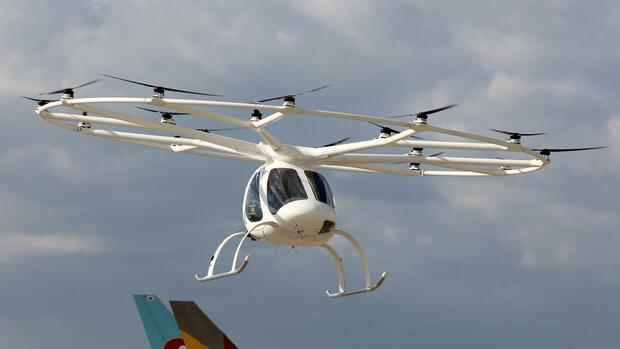Frankfurt, Dusseldorf The German air taxi start-up Volocopter from Karlsruhe is bringing a former Airbus manager to the top of the company. Dirk Hoke, former head of Airbus Defense & Space, is to replace Florian Reuter from September. “I’ve known Dirk for a long time and I suggested him to the Advisory Board myself,” Reuter told Handelsblatt on Tuesday. “I think he’s just right for Volocopter.”
There has been speculation about a departure from Reuters for a long time. Some investors are said to have been dissatisfied with the company’s current development. The young company from Karlsruhe failed a few months ago with the plan to merge with a stock exchange shell and earn 800 million dollars in the process. The environment was too bad, it was said to justify. The setback had personnel consequences, CFO René Ggurtel had to go.
In addition, there is a financing construct that is now taking revenge for many investors. Volocopter used so-called crowdfunding for its first round of financing. 750 investors gave the company 1.2 million euros nine years ago. The investors participate via so-called profit-participating loans and are given the right to share in the success and to be paid out after the end of the contract.
The problem: There is no profit-sharing so far, Volocopter does not make any profits. The hoped-for lucrative exit via the IPO has in turn failed. That causes frustration. On the other hand, a few days ago Volocopter managed to collect another 153 million euros in a financing round.
Top jobs of the day
Find the best jobs now and
be notified by email.
Reuter himself says that he decided a long time ago to do something new again. However, he wants to stay until Hoke is handed over and thus longer than he had actually planned. “After that, I’ll treat myself to a short break.”
Dirk Hoke is said to have been signed by the end of 2021
Hoke’s commitment is said to have been agreed by the end of 2021. According to Handelsblatt information, the news triggered euphoria in the start-up’s advisory board. The prospect of the new boss has united investors again, it is said. The latest round of financing is said to have come about because of this and a major initiative by existing investors. The Chinese automaker Geely in particular is said to have pushed both issues.
Volocopter is considered to be one of the companies that have come a long way in terms of development. The Karlsruhe flying taxi has already completed numerous test flights, including one in South Korea last November with a pilot on board. A few months ago, Volocopter acquired DG Flugzeugbau from Karlsruhe, a specialist in gliders. The takeover gives Volocopter access to a licensed production facility.
>> Read about this: Lilium wants to significantly simplify its high-flyer
The people from Karlsruhe also sought contact with the supervisory authorities earlier than others. Despite all the successes, Volocopter, like all its competitors, still faces the greatest challenge: the approval of the aircraft and the development of a viable business model. Electric VTOLs are an entirely new breed, and there is a lack of experience for supervisors to build on in their testing. Even the certification of regular commercial aircraft is regularly delayed.
With Hoke, a manager is now coming on board who knows the hurdles of approval very well. “The experience I gained at Airbus and Siemens will help us monetize Volocopter’s leading market position, which was achieved under Florian,” the manager is quoted as saying in a statement: “Bringing electric air taxis to the cities of the world is a must the realization of a dream of mankind, including mine.”
The former Airbus manager knows the hurdles for the approval of aircraft.
(Photo: dpa)
However, it is also a fact that the hype that arose among venture capitalists last year about the electric high-flyers has been noticeably waning for some time. This is particularly evident in those companies that used the enthusiasm of investors to go public.
The price of German Volocopter rival Lilium, which went public on the US technology exchange Nasdaq in September, fell from around ten to a good three dollars. The US competitor Archer recorded similar price losses. The course of the US company Joby Aviation halved.
More and more investors are realizing that the often ambitious promises made by young entrepreneurs can hardly be kept. They want to start operating their air taxis as early as 2025 or 2026. Volocopter is even planning to fly visitors around the area at the Olympic Games in Paris in 2024.
At the same time, the young companies have to start mass production. Nevertheless, they soon promise revenues in the millions or even billions. But it will probably take a lot longer for the aircraft to carry passengers. The crash of an unmanned air taxi from Joby Aviation during a recent test flight showed just how great the challenges are that aviation pioneers still have to face.
More: Cancel, renegotiate, continue investing: This is how the start-up boom will continue
